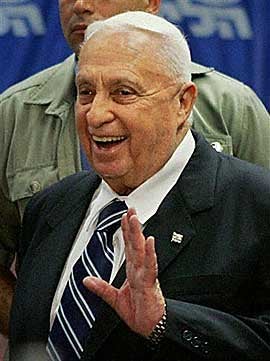Your support helps us to tell the story
From reproductive rights to climate change to Big Tech, The Independent is on the ground when the story is developing. Whether it's investigating the financials of Elon Musk's pro-Trump PAC or producing our latest documentary, 'The A Word', which shines a light on the American women fighting for reproductive rights, we know how important it is to parse out the facts from the messaging.
At such a critical moment in US history, we need reporters on the ground. Your donation allows us to keep sending journalists to speak to both sides of the story.
The Independent is trusted by Americans across the entire political spectrum. And unlike many other quality news outlets, we choose not to lock Americans out of our reporting and analysis with paywalls. We believe quality journalism should be available to everyone, paid for by those who can afford it.
Your support makes all the difference.Sharon's decision redraws Israel's political map, formalising his transformation from hard-liner to centrist and increasing chances of progress in peacemaking with the Palestinians after March elections.
Sharon felt Likud hard-liners, who had tried to block this summer's Gaza pullout, were imposing too many constraints on him and would prevent future peace moves.
This morning, Sharon arrived at President Moshe Katsav's house to ask for the dissolution of parliament, a step that would move up the date of the vote to the beginning of March.
Sharon's decision, to be formally announced later today, sent shock waves through Israeli politics, and set the stage for a dramatic election campaign. It would pit a smaller, hard-line Likud, possibly under former Prime Minister Benjamin Netanyahu against Sharon and the new Labour Party leader, former union boss Amir Peretz.
One poll today said an alliance of Sharon's new party with the moderate Labour and leftist parties would command 74 seats in the 120-member parliament.
It was seen as unlikely Sharon would seek a coalition with Likud, after hard-liners in the party spent months trying to halt the Gaza pullout, and came close at times to bringing down the government.
A March vote would come just a few weeks after Palestinians hold a parliament election in which the Islamic militant Hamas is competing for the first time. Sharon has said he would not hold talks with a Palestinian government that includes Hamas members.
Removed from the constraints of Likud, Sharon would be free to pursue the more moderate line he has espoused in recent years - part of a dramatic turnaround from a fervent supporter of Jewish settlements to the first Israeli leader to dismantle West Bank and Gaza communities.
Asaf Shariv, a top Sharon adviser, said the prime minister will officially announce the formation of his new party later today. Sharon will also ask Katsav to dissolve parliament - the first step to an early election, Shariv said. Elections will likely be held in March 2006, seven months early.
Sharon had repeatedly said the general election would be held in November as scheduled, but after Peretz took over control of Labour, an early poll became inevitable. Peretz insisted on pulling Labour out of Sharon's coalition, depriving the prime minister of a parliamentary majority.
Sharon is expected to take several prominent Likud Cabinet ministers with him into his new party, along with some from Labour. It is possible Shimon Peres - the ousted Labour Party leader - will join forces with Sharon.
Public Security Minister Gideon Ezra said the refusal of the Likud rebels to support Sharon's future peace moves forced the prime minister to leave his political home.
"I think that it is not an easy day. I had hoped that this wouldn't have to happen, that we would all remain together," Ezra told Israel Radio. "I had hoped ... that the members would say we are all falling into line, but that didn't happen and Ariel Sharon decided what he decided and I am going with him."
Sharon's departure turns Likud into a hard-line party that opinion polls show will be the main loser in an election.
"I regret Sharon's decision to leave and would have preferred that he continue his struggle within Likud," said Likud politician Ehud Yatom, a leader of the internal rebellion against Sharon.
At least five Likud Cabinet ministers have said they will compete for the party's leadership after Sharon's exit.
Israel's president today said he would make a quick decision on a request by Prime Minister Ariel Sharon to dissolve parliament, adding that an early election appeared inevitable in the current political climate.
The president, Moshe Katsav, spoke after a meeting with Sharon. Katsav said the law gave him 21 days to decide, but that he would decide quickly.
Asked whether the decision would be made within days, he said, "less than days."
"Of course, I think we need to dissolve the Knesset and hold elections as soon as possible," he added.
If Katsav approves the dissolution of parliament, a new election would have to be held by March.
Sharon made the request just hours after he decided to quick the hard-line Likud Party he helped found in 1973, and to compete in the next election as the leader of a new party.
Subscribe to Independent Premium to bookmark this article
Want to bookmark your favourite articles and stories to read or reference later? Start your Independent Premium subscription today.

Join our commenting forum
Join thought-provoking conversations, follow other Independent readers and see their replies
Comments